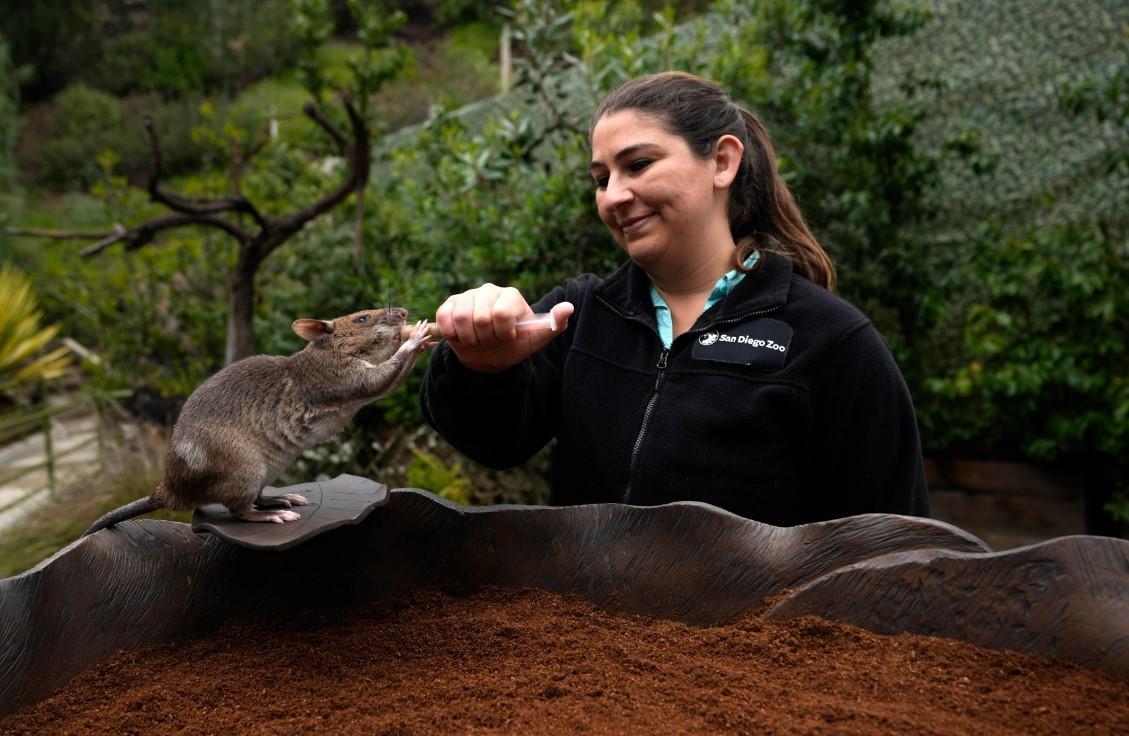
As an ambassador for rats, it’s never easy to win over the public. There’s that hairless tail after all.
But Runa at the San Diego Zoo is doing her best to counter the bad press. She is one of a handful of such so-called ambassadors showing off the virtues of rats at three U.S. zoos. The rats were provided by a Tanzania-based organization that is training African giant pouched rats to combat wildlife trafficking, detect diseases and perform other useful tasks.
At least twice the size of the common brown rats found in cities, African giant pouched rats like Runa are best known for ferreting out landmines and other explosive material on old battlefields in Angola, Mozambique and Cambodia, earning them the nickname “hero-rats.” Efforts are underway to expand the use of their keen sense of smell to finding people trapped in collapsed buildings, detecting diseases in laboratory samples and alerting officials to illegal goods at ports and airports.
Six African rats completed their first trial working in the field in March, spending a month at a port in Tanzania where they were tasked with detecting smuggled goods, including Pangolins. The scaly anteater is coveted by poachers and is among the most trafficked animals in the world.
Nicki Boyd, of the San Diego Zoo and Wildlife Alliance, said rats offer an important tool to combat wildlife trafficking, which the zoo wants to highlight since the illegal animal trade “is very destructive to the species that we are actively trying to save and protect in the wild.”
“I do think there is the ability to scale this up,” she said.
But rats still have a ways to go in winning over everyone. Last week, New York Mayor Eric Adams introduced Kathleen Corradi, a former elementary school teacher and anti-rat activist, as his new “rat czar” whose job is to battle potentially millions of rats lurking about the city.
Rats can spread disease like leptospirosis, which on rare occasions can lead to meningitis and cause the kidneys and liver to fail.
Izzy Szott, a behavioral research scientist at the Tanzania-based organization APOPO, which is training the rats to work for governments, said she was not surprised to hear rats had been named enemy No. 1, but she wants people to know the full picture. Her hope is having ambassador rats at renowned zoos, like San Diego’s, will lead to more understanding and support for rat research.
Szott said rats often “get a bad rap,” but that it’s important to “consider our responsibility towards the wildlife around us and that we share the planet with.”
“We need to understand the capabilities that these animals have and see them in a humane way and treat them in a humane way,” she added.
African giant pouched rats have sniffed out more than 150,000 landmines to date, according to her organization.
They’ve also helped health clinics in Africa diagnose people with tuberculosis, detecting the bacteria in the sputum samples of 25,000 patients.